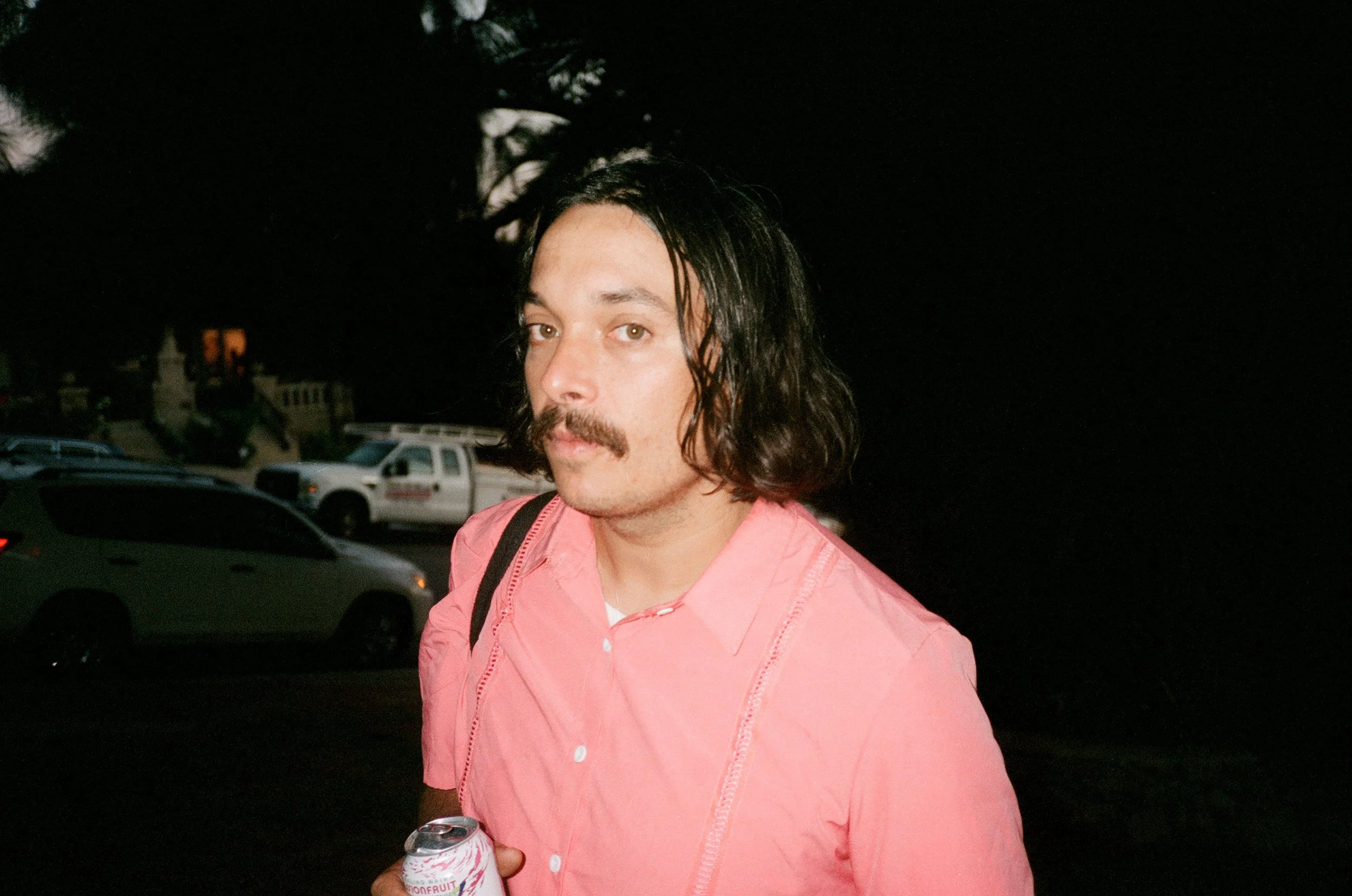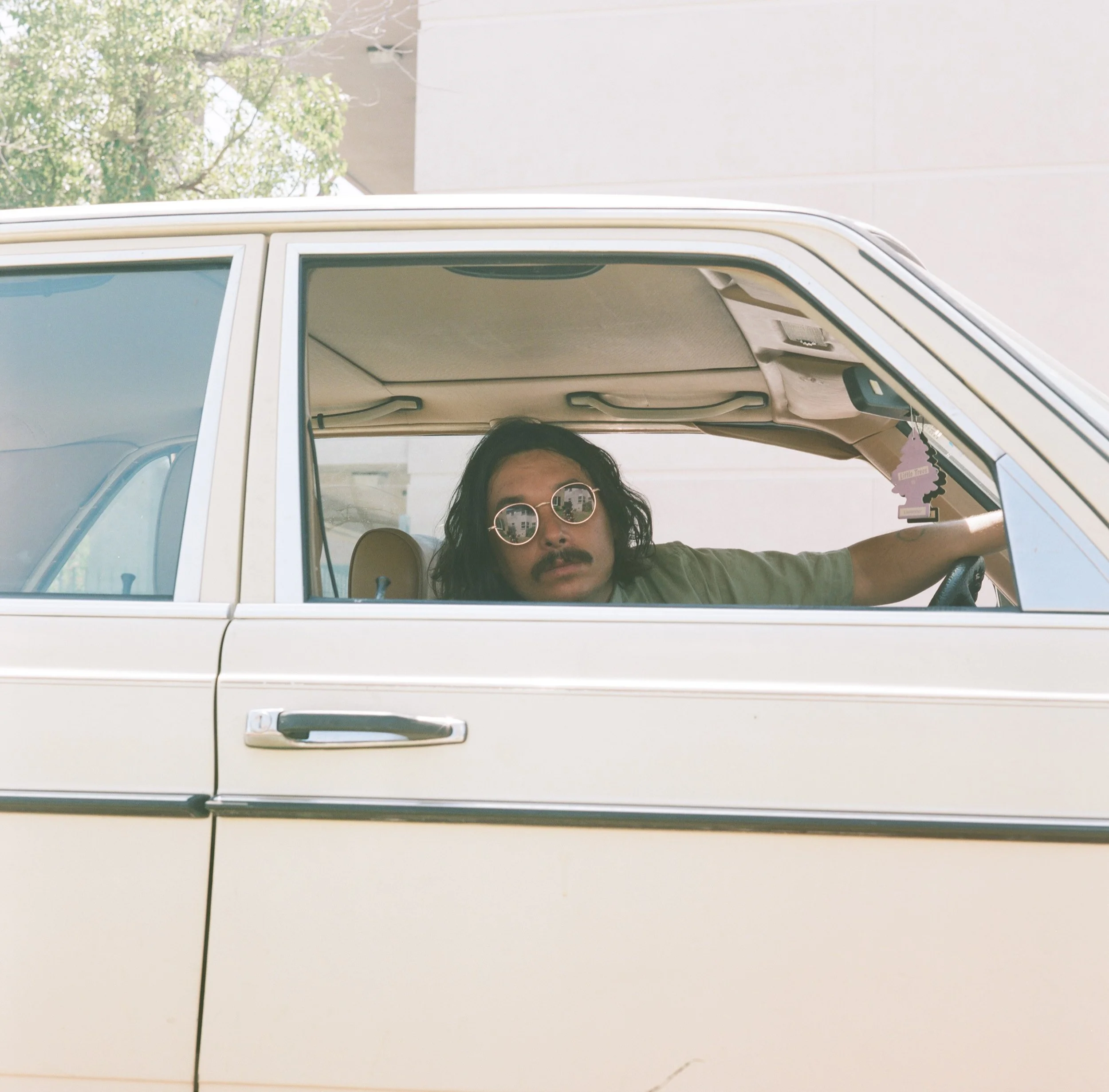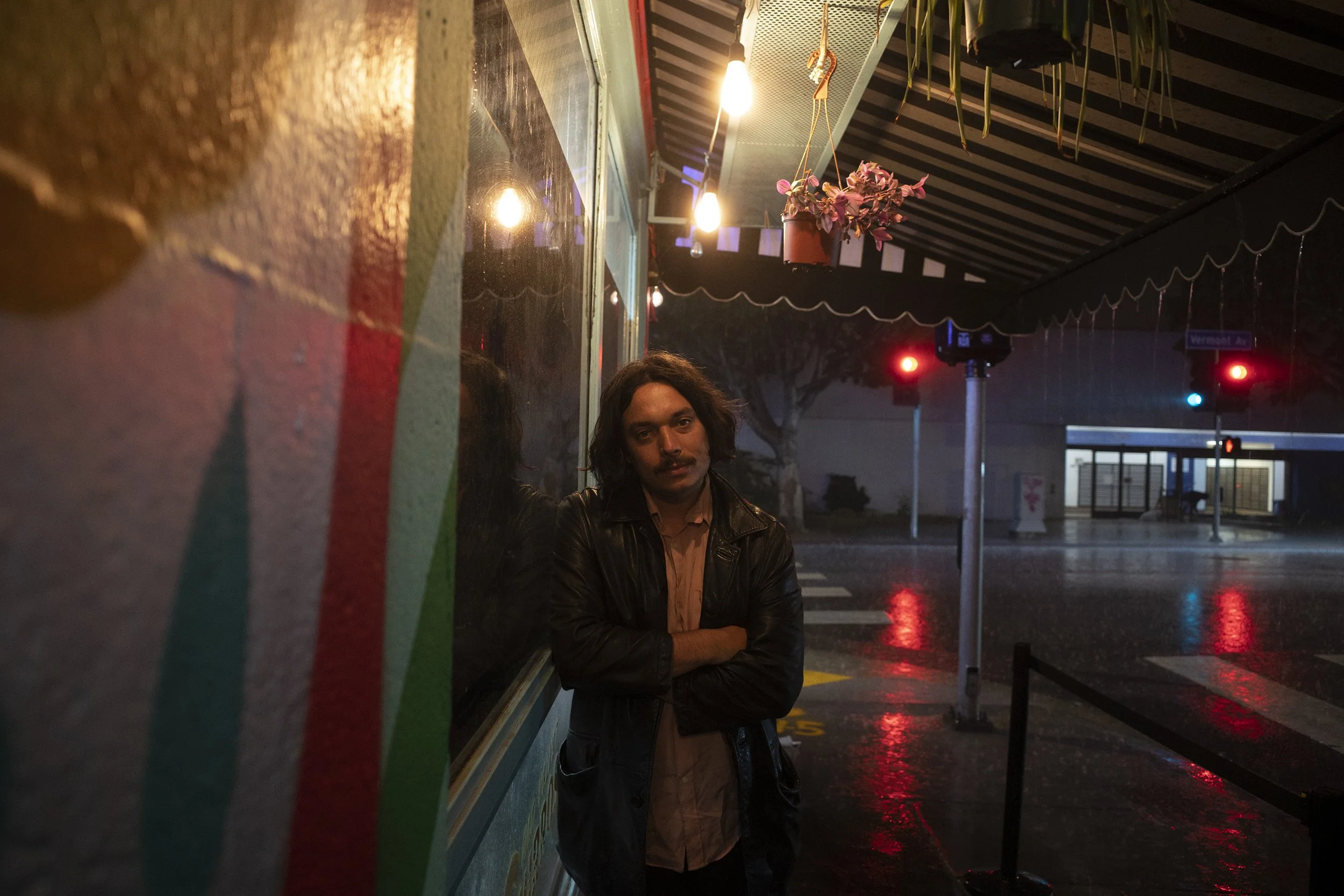Drugdealer: On The Road Again
Credit: Tessa Binder
LA’s coolest cat and self-proclaimed film nerd Michael Collins, the genius behind the musical project Drugdealer, has taken a voyage of self-discovery on his new studio full-length, ‘Hiding In Plain Sight’. Exploring new territories in his vocal range, he charts his creative journey in immaculate fashion, documenting his life throughout the coronavirus pandemic in a wry style, and the depths to which an artist will go in order to evoke a new sonic process. Out today, over nine tracks, the record is a loose continuation of the aural DNA that’s gained Drugdealer warranted love and attention the world over. Just days before this ethereal LP was released, we sat down with Collins to chat cinema, auditory influences and the themes behind his new album…
Now first and foremost, you talk about personal doubts nearly resulting in this record not being made. Could you elaborate on this?
There was just this kind of dynamic that I had with music from the very jump. I started out basically making experimental electronic music, and then at some point, I decided that I wanted to try to write songs. I was doing a lot of psychedelics and writing songs honestly felt very unnatural to me, but something that I felt at the time would be a really interesting challenge. So from the very job, I kind of approached writing songs from a sort of left-field perspective. It was just something that I tried to forge my way into, so I focused so much on trying to learn how to compose and play the piano and be able to write stuff. I focussed so much on storytelling that from a young age I never felt like singing was something that I could do. Some of the songs that I wrote that other people sang, were more successful and it was something that I recognised, “okay the writing is there but I just never felt comfortable singing.” I got to a point when I was talking to other artists that I was collaborating with, but I didn’t know if I could keep going on this way because I knew I was supposed to feel differently about being a lead singer-songwriter in a band.
You do sight an interaction with Annette Peacock as being an eye-opening and inspirational experience in your writing process, can you tell us more about that?
I ended up getting some advice from an older artist before the pandemic that I was singing in the wrong range and that I needed to sing higher by almost two whole steps or something like that. She was an older artist who was also playing at the festival that Mexican Summer does in Marfa, Texas. I asked her advice with a quick audio clip, and she said “you're singing too low.” So when I came back, and the pandemic started, I was like, “alright, I don't know if I'm gonna hang this up. I love making music, but I want to sing more.” I tried it and I'm getting there with everything that I've written since then, but I've been pushing the range of singing up and it's just another thing that I've been slowly coming to, as with so many things that come with doing music later in life. I don't know, it just feels a lot more natural to sing in this range, it allows my voice to be broken up and I’m not worried about it sounding perfect or smooth.
Credit: Shags Chamberlain
Littered throughout your discography have been features from such talented artists, whom you described as trusted friends – do you feel that alieves the pressure that you put on yourself as you’re working with people who you have so much confidence in?
Yeah as I said I feel totally different. I've sort of found a sound in my voice that I'm interested in pushing and playing with. There was definitely an element before where I felt I had a really beautiful idea, but I didn't know if I can dutifully be the one, and just having certain people whose voices I had loved for so many years be so very close to me was more of an empowering thing as a writer. It definitely makes you a better songwriter to be able to try and work with some people like Weyes Blood or Sasha, who’ve been playing music with me since the very first years. They have incredible voices and they tour with me and sing with me on my records, and there are so many other people like Jackson MacIntosh that I've worked with over the years. When I hear their voices, they've definitely empowered me as a writer to bring some of the things that I have, to life. I'm interested to see what's coming down the pipeline next because I feel I've sort of gotten over that hump and there are definitely certain songs that I want to sing. In the making of this record, I had to sing most of it in order to get through it.
When describing the track ‘Hard Dreaming Man’ you speak of telling stories as being something you admittedly do at a high level and that this song is about a restless decade on the road, can you expand on this for us and talk about how your life experiences pre ‘Drugdealer’ still influence your songwriting to this day?
When I left high school, I went to art school to study film, and when I was there, I realised I should have maybe gone to film school. That's been my dream my whole life to make films, and then as soon as I realised that it wasn't really the right place for it, I realised I wasn’t really ready to make films yet. All of this was in Baltimore, where I was going to live for the next six and a half years, and that's where I was inspired to start making music. However, before I even really got seriously into music at all, I was just living in Baltimore, and I met some people that were gonna go, hop trains, and I just kind of followed them kind of just aimlessly. I ended up getting brought into that world, and I always, from a very young age, was always extremely focused on cinema, as well as wanting to see the entire world. As soon as I started hopping trains there was just this transformative experience, and that's kind of why I wrote that song. I'm somebody who naturally wants to understand things, and I need to be able to let go of control in order to hit the sweet spot of understanding. So, by the time that year was over, I just happened to be back in Baltimore. Just in general, travelling that way for me was extremely therapeutic; before I'd ever really approached like, clinical therapy. When you travel that way, and you come back into a world where everybody is trying to get ahead and everyone's trying to make a name for themselves, you very quickly remember that six months ago, all you wanted to do was to find a place to sleep behind a building in Nashville and it just humbles you. ‘Hard Dreaming Man’ is a song that was just kind of an ode to the privilege and freedom of being able to tramp around and explore, which was really restricted by the pandemic. It was sort of a cry out for help and wanting to get out in the world again, you know?
“I think my mind has been attenuated towards that aspiration, and then also, listening to bands like the Velvet Underground, and like John Cale and The Kinks and The Zombies, these bands are just absolutely unbeatable in terms of the way that their songs make me feel, and there’s not a hell of a lot going on there”
Speaking of influences, the sound and instrumental arrangement of ‘Hiding In Plain Sight’ takes me back to John Lennon’s 1970 record ‘Plastic Ono Band’, in that less is more. What do you feel this gives to the music and which artists have influenced your sound?
I just really like clarity. I think that’s why any minimalist artwork is good because the information that you do glean is more meaningful. I understand that a lot of people really like music that's very maximal and that stuff has a total beauty to it, but for me, I'm just sort of, like traditional in that way. I'm so inspired by old cinema, there's a functionality to music in filmmaking, where if you know your musical cues, whether they're songs or whether they're scores, there's a functionality to it; it aids the storytelling and there's a clarity to an idea. I think my mind has been attenuated towards that aspiration, and then also, listening to bands like the Velvet Underground, and like John Cale and The Kinks and The Zombies, these bands are just absolutely unbeatable in terms of the way that their songs make me feel, and there's not a hell of a lot going on there. You might be able to have eight people playing on a song, but you want it to sound like there are only three or four people playing and the only way that you can do that is through restraint. That’s what I focus on doing a lot too, like in the song ‘New Fascination’ another band might have just put guitar throughout the whole song, but in making that song I was trying to find my voice and just create a very minimal palette for us to work through.
On a recent podcast you did with The Ion Pack you said you “would rather be a filmmaker than a musician” – do you ever create visual accompaniments to your music in your head as if you were writing for a movie? And what sort of movies were you watching during the writing and recording process of this latest record?
I don’t create a visual accompaniment when I write songs, but I think a lot about the world of cinematic sound. When I write songs I separate them a little bit from my aspirations in cinema, but the funny thing is that when I create these albums, I very much think of the whole thing as part of a film, and I definitely think with me coming from a non-traditional place in terms of starting to make music when I was 20 instead of when I was really young, it's like my whole life growing up I just studied film and filmmakers, and definitely, at this point, I can see in the way I approach this record is more influenced by directing than looking at other bands for inspiration.
Credit: Andrea Adolph
You spoke of Sasha Winn being your chief musical companion and someone with whom you are “very romantic.” What is it about Sasha that you love so much?
Sasha’s somebody who I met when I first went out on tour as a solo artist. Basically, I would just loop people in the crowd and just hand the microphones out and stuff, and just make walls of sound, like I was really into noise music and Sasha was in a noise duo. During that tour, we actually hit it off so much, that by the end of the tour, we were making music together. Sasha was in a band on that tour where they weren't really singing very much, and I just heard throughout the experience of being on tour, how great her voice was. I was just like, “hold on you need to be singing.” So from the very beginning, when we met, there was like a synergy of both of us wanting to be part of this, experimental noise world for so long. Straight away I was like “what about if I wrote some songs, or learned how to write some songs for your voice?” So straight away, I was trying to write for other people's voices, and Sasha's voice is just, it's just the most incredible. In fact, we actually live together right now, and we've lived together multiple different times in multiple different states. I think a lot of what binds us as well is that we both have an extreme overt tenacity for exploration, specifically travelling.
So tell us, who were you listening to during the writing process of this record and who are you really enjoying right now?
I was listening to Danny O'Keefe a lot, and I was listening to a lot of Liverpool Express actually. I always listen to a lot of what my friends are listening to. When I was making this album, my manager was getting me really into Doug Psalm from the Sir Douglas Quintet. We were listening to Ian Matthews who used to be in Fairport Convention, his ‘70s and ‘80s solo records. During the pandemic, we would just have a rolling playlist going, and just listen to so much stuff. Recently, I've just been listening to a bunch of Temz and Drake. There's gonna be some music coming out soon that people are not going to expect from me, my first love was R&B and electronic music.
“I always think that there’s a magical feeling when I’m about to play to like a sold-out crowd. It just hasn’t worn off, how grateful I am that people actually care about the music that I make”
Your live shows always seem such an uplifting, happy, and most of all, laid-back affair. What is your attitude to playing live and what are you thinking as you walk on stage each night?
I mean, when I get on stage, I immediately recognise the fact that I think it's incredible that I actually have a music career. Growing up until I was 20 years old, I was never thinking about it and now being able to have one, I always think that there's a magical feeling when I'm about to play to like a sold-out crowd. It just hasn't worn off, how grateful I am that people actually care about the music that I make.
Speaking of live shows, I’m personally dying to see you live, as I’m sure many other fans are across the pond, what is the likelihood that we’ll be seeing Drugdealer smashing the ivories in the UK in 2023?
Definitely, my managers trying to figure out a route for us to go. I'm really excited to play, playing the UK has been some of the favourite shows I've ever played in my life. It's incredible how much people actually care about songs out there. When I talk to people outside of a show in Europe, people have a list of questions; they’ll come to me with questions that they want to be answered about songs. The fan culture there, it’s very academic about music, and it’s very cool. I like it.



